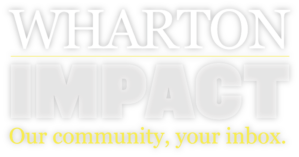October 2022 • Edition 14
In this edition, read about Dean Erika James’s vision for Wharton; learn about a new initiative to improve the management of chronic kidney disease; and find out how Penn Medicine memorialized its scientific breakthroughs addressing COVID-19.
Acknowledging Hope, Optimism, and Opportunity

Dean Erika James’s annual fall appeal is a message of hope and optimism to the Wharton community. The appeal includes her insights into the latest developments at Wharton and her plans for the School’s future. James emphasizes the importance of inclusive community building on campus and in the business world for identifying both challenges and growth opportunities. In that vein, the School has launched new efforts to tackle environmental, social, and governance (ESG) issues, and the Wharton Coalition for Equity and Opportunity (CEO) is set to become a go-to source for evidence-based solutions to inequity and lack of opportunity.
Dean James believes that Wharton’s students are the School’s primary stakeholders and support for them means Wharton is changing lives; transforming business – and changing the world.
Improving Care and Addressing Racial Inequities

The University of Pennsylvania’s Leonard Davis Institute of Health Economics (LDI) is launching a new initiative to support research on improving the management of chronic kidney disease (CDK), with a particular focus on addressing disparities including structural barriers and racial inequities.
“This research initiative provides the opportunity to generate rigorous and important new evidence to advance the field through effectively identifying, managing, and improving outcomes of patients with CKD, while also reducing health inequities,” said LDI Executive Director Rachel M. Werner, who is also a professor of health care management and economics at Wharton.
Wharton’s Stevens Center for Innovation in Finance Leads Development of Penn’s First NFT

Innovation abounds at Penn — through scientific breakthroughs addressing COVID-19 and novel partnerships that memorialize such milestones in the University’s history. Penn’s first non-fungible token (NFT) has been developed to commemorate research at the Perelman School of Medicine that helped lead the fight against COVID-19 through mRNA-based vaccines. The development of the NFT was led by the Wharton School’s Stevens Center for Innovation in Finance, which includes a Blockchain Laboratory, in collaboration with Penn Medicine and the Penn Center for Innovation (PCI).




